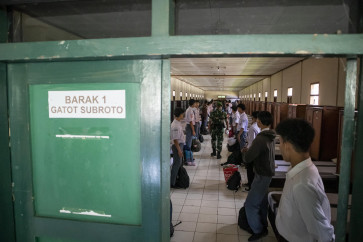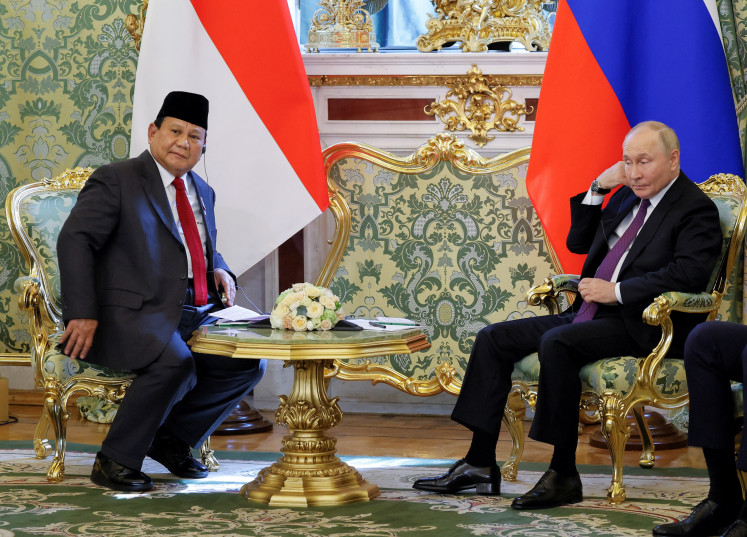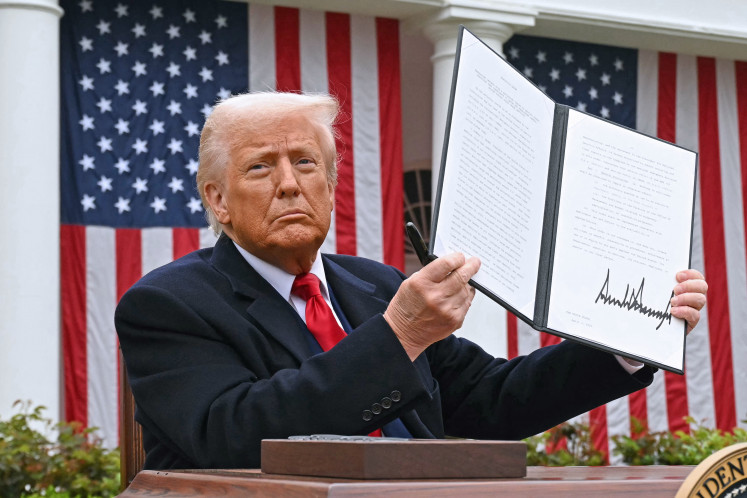Harmoko: Soeharto’s man who publicly told him to resign
Harmoko was one of Soeharto’s most trusted ministers, who led the much feared Information Ministry for 14 years.
Change text size
Gift Premium Articles
to Anyone

W
hat can we learn—positively or negatively—from former information minister and Golkar politician Harmoko who passed away at the age of 89 on Sunday, in Jakarta?
For me, it is that you should not wait until the last moment before jumping from a sinking ship. And you should learn how to adjust to a new situation. Other survivors of the disaster or the families of the drowned passengers or crews might blame you as a traitor who only cared about your own safety but with the passage of time, people will forgive you or have a better understanding of the circumstances of that time. Eventually you will be reconciled with them, especially when they remember you as a good man.
As a former member of then-president Soeharto’s Cabinet, Harmoko deserves his resting place at the Kalibata National Heroes Cemetery in South Jakarta. Harmoko was one of Soeharto’s most trusted ministers, who led the much feared Information Ministry for 14 years. He was the first civilian to lead Soeharto’s Golkar Party, and later chaired the “rubber stamp” House of Representatives just to ensure the stability of Soeharto’s government.
May 18, 1998, thousands of students and antigovernment protesters were occupying the House and People’s Consultative Assembly (MPR) building in Senayan, Central Jakarta. They demanded the immediate resignation of Soeharto who had ruled the country since 1966. Jakarta was gripped in a fearsome situation following the massive riots in the capital city and other cities, including Surakarta in Central Java, after security forces opened fire on Trisakti University students in West Jakarta and killed four of them. The country was enduring emergency economic treatment by the International Monetary Fund and international markets had lost trust in the rupiah.
The protestors demanded House speaker Harmoko, who could not leave the compound on that day, to hold a dialogue with them. They knew Harmoko was one of Soeharto’s most trusted men. He served as Soeharto’s information minister for 14 years until 1997, and never hesitated to flatter Soeharto in his press conferences or public speeches. Soeharto promoted Harmoko as the chairman of Golkar from 1993 until 1998.
Under Harmoko, Golkar claimed its biggest election win in 1997, regardless of alleged fraud, intimidation and vote rigging. Due to the success, Soeharto awarded Harmoko the speaker’s post.
Being a Soeharto loyalist, Harmoko was popularly known among government circles as Hari Hari Omong Kosong (empty talk every day). However, the veteran cartoonist and journalist often told journalists it was a beautiful nickname.
As information minister, Harmoko’s regular job was to brief the results of monthly Cabinet meetings, When he began the press briefing, he never forgot to say “Menurut petunjuk Bapak President” (According to the President’s instructions). Many might get bored with his briefings, which frequently concerned updates on the prices of staple foods, such as rice, wheat, salt and sugar. The statistics were important because Soeharto believed when the people’s stomachs were full they would not revolt against him.
During the May 1998 uprising, Harmoko was in the difficult position of facing angry and aggressive protestors. His house in Surakarta was burned down by rioters. People also boycotted his newspaper Pos Kota, a popular yellow newspaper in Jakarta. Many were angry with him, because in January 1998, he claimed that the Indonesian people still wanted Soeharto to rule. Harmoko insisted that Indonesians could not imagine how the country could survive without Soeharto.
On March 10, Harmoko announced that all factions at the MPR, including the Armed Forces faction, had unanimously reelected Soeharto as president and his golden boy BJ Habibie as the vice president for 1998-2003.
Before Soeharto’s inauguration as the president for the seventh time on March 11, Harmoko said in his speech: “The whole nation of Indonesia will be always be with you, in entering the new century, the 21st century, which now lies in front of us, full of a sense of optimism and by sticking to the spirit of more solid togetherness, unity and cohesion.”
But on May 18, Harmoko gambled with his own life, and he knew very well that he should survive. Some described Harmoko’s betrayal of Soeharto was akin to the story of Jesus’ most trusted disciple, Peter, who denied his master in order to survive.
“In response to the current situation, the House speaker and the deputies, hope, that for the sake of the nation’s unity and cohesion, the President is wise and thoughtful, and therefore it would be better for him to resign,” Harmoko told the surprised students. They cheerfully proclaimed him as a Reform hero on the spot.
Soeharto was very angry and his children were shocked. They vowed that they would never see him again. On May 21, Soeharto stepped down, allowing Habibie to take over. Soeharto did not want to talk to Harmoko and Habibie before the latter’s swearing-in ceremony at the Presidential Palace.
Harmoko was born in Nganjuk, East Java, on Feb. 7, 1939. He started his career as a journalist, including as cartoonist at Merdeka daily. As chairman of the Indonesian Journalists Association (PWI), Harmoko helped The Jakarta Post obtain its publishing permit from the Information Ministry. For his contribution, he was awarded a 5 percent stake in PT Bina Media Tenggara, the publisher of the Post.
After the fall of Soeharto, Harmoko chose to disappear from the public. People seemed to forget or forgive him. Why? It was true that Harmoko was very stern in stifling press freedom, including banning three magazines critical of the government, but he was very good at interpersonal relations. He was always charming and friendly to people, including victims of the press closures. And the public never heard any reports about corruption or abuses of power involving him or his family.
As a seasoned politician, Harmoko knew very well how to survive and adjust himself to the changing environment.
***
Senior editor at The Jakarta Post









